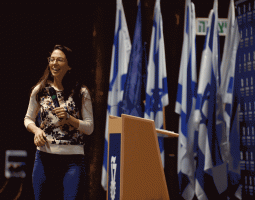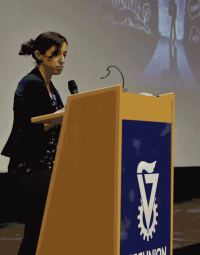Tech Women
In conjunction with International Women’s Day: 600 High School Students join Tech Women 2018
The event encourages outstanding female students to pursue academic studies in science and engineering.
Doctoral student Adi Hanuka of the Faculty of Electrical Engineering said at the conference: “In order to change the discourse and to encourage female students, I formulate the tests I write using female pronouns.”
From Kibbutz Na’an to Ramat Gan, from Ashdod to Nazareth Illit: Some 600 outstanding female high school students took part in Tech Women 2018 on March 7th, 2018. In it’s third consecutive year, the Technion-sponsored event encourages excellent female students to pursue academic studies in science and engineering. The event was held in conjunction with International Women’s Day, courtesy of the Rosalyn August Girls Empowerment Mission (GEM).
All the students attending the conference are studying for matriculation in five math units as well as science and technology. The students met with female researchers, faculty members, Technion alumnae, and graduate students. On tour of Technion laboratories, they were introduced to an array of inspiring topics of study and research.
In the Technion’s original class of 1924, the percentage of women was 0.06%: one of the 17 students was female. Over the years – and especially in the past decade – the number of female students at Technion has grown tremendously, reaching an all-time high this year at 40 percent. The rate of female doctoral students is even higher, at 42 percent.
The high school students heard scientific lectures and visited laboratories at eight engineering and scientific faculties at Technion: Electrical Engineering, Computer Science, Mechanical Engineering, Aerospace Engineering, Physics, Mathematics, Chemistry, and Industrial Engineering and Management (Data Science & Engineering track).
The day was opened by three Technion doctoral students, who shared their stories. “As a child I was curious – I was never satisfied with answers and always asked for detailed explanations. Thankfully, I felt that my curiosity was welcome at home and at school, but when I decided to be a physicist there were people who told me it was a profession for males,” said Efrat Sabach, a doctoral student in the Faculty of Physics. “Obviously this isn’t true, and I’m glad that I didn’t listen to them. After my Bachelor’s degree at Technion I continued to my Master’s and PhD studies, and today I am studying the process of the formation of stars such as our Sun, under the guidance of Prof. Noam Soker. At Technion I received tools and knowledge that will accompany me for the rest of my life. Believe me when I say that even if you are not sure what you want to be when you grow up, Technion is the right place to start.”
“When you think of electrical engineers someone like me probably doesn’t come to mind, but here I am – a woman and a doctoral student at the Viterbi Faculty of Electrical Engineering,” said Adi Hanuka. She told the students about two projects she has conducted in recent years: a tiny particle accelerator that can be used for x-ray and projection devices, and a system for monitoring diseases based on eyelid movements. “During my doctoral studies I spent time at Stanford University in the United States,” Hanuka said. “The people in my research group were surprised to find out that I’m a woman and not a man, and one of them added that girls are supposed to study economics and psychology, not electrical engineering. That’s why I believe it’s not only necessary to educate girls and tell them that they can make their dreams come true, but also to make the boys around us understand that we are not inferior to them in skills and abilities. I tutor students at the Faculty, and when I write tests I always word the questions using feminine pronouns, in order to encourage the students taking the exam – because why always write in the masculine?”
Nitzan Krinsky, a doctoral candidate at the Wolfson Faculty of Chemical Engineering at Technion, develops artificial cells that produce anti-cancer drugs within the cancerous tumor. She spoke about her studies in the academic reserve, her military service as a researcher at the Institute of Marine Medicine, about managing projects in the IDF food department, and the decision to leave the army for the sake of academic research at Technion. “At each of these stages I had to show initiative and make appeals in order to move on to the next stage. That’s why it’s important for me to tell you that in order to succeed in fulfilling your dreams you have to do what suits you: take initiative, overcome the challenges, and mostly – don’t be shy.”





